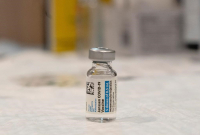Support strong Canadian climate journalism for 2025
Canada's COVID-19 vaccination drive is poised to shift into high gear this week as the federal public health agency prepares to take delivery of the largest number of doses since the launch of the immunization effort.
More than 1.94 million doses of the Pfizer-BioNTech vaccine are set to arrive this week, alongside 846,000 shots of the product developed by Moderna.
Figures from the Public Health Agency of Canada suggest the pace set over the next seven days will mark the start of a sustained delivery ramp-up, with Pfizer-BioNTech expected to continue providing weekly shipments of at least a million doses for the foreseeable future.
The accelerated pace of inoculation deliveries marks a dramatic reversal from earlier in the year, when production delays in Europe caused the pharmaceutical giants producing the coveted shots to pause a number of international shipments.
The torrent of vaccines flooding into the country over the next seven days is set to receive an additional boost in the weeks ahead due in part to a pending exchange between Canada and the United States.
Public Procurement Minister Anita Anand said on Friday that Canada was finalizing an agreement with its neighbour to the south that would see Ottawa receive 1.5 million doses of the Oxford-AstraZeneca shot before the end of the month.
Delivery dates for the promised injections, however, are still up in the air.
Supplies are expected to increase further when two other vaccines cleared for use in Canada begin arriving en masse.
Shipments of both the AstraZeneca vaccine and the one-dose shot from Johnson & Johnson are widely expected to start arriving in Canada in April, though that timeline too has yet to be finalized.
Anand has said Canada is expected to receive a total of 9.5 million doses of COVID-19 vaccines by the end of the first quarter of this year.
She said this week's delivery of Moderna vaccine will be staggered over two shipments over the next seven days.
“The increasing size of the shipments that Canada is receiving means that at times weekly allocations may be divided into multiple deliveries," she said.
"...Rather than waiting until the end of the week to ship the entire order of 846,000 doses at once, it was decided to expedite the portion of the order that is ready so it arrives in Canada earlier.”
Deliveries from Moderna were previously scheduled to take place every three weeks, but earlier this month the company stepped up the pace by sending shipments every two weeks instead.
The Public Health Agency of Canada said Sunday that more than 670,000 doses of COVID-19 vaccines were administered last week alone. Government figures show more than 3.95 million doses have been administered across Canada as of Sunday, and 629,956 people have been fully vaccinated.
The agency said there have been no unexpected vaccine safety issues identified in Canada to date.
A handful of countries suspended its use, but at least four reinstated it after a review from the European Medicines Agency found no elevated risk of clotting.
Canadian authorities, too, have reaffirmed their support for the shot.
"Based on the information to date, Health Canada confirms that the benefits of the AstraZeneca COVID-19 vaccine, in protecting Canadians from the severe outcomes of COVID-19, continue to outweigh any risks," the agency said.
This report by The Canadian Press was first published March 22, 2021.
This story was produced with the financial assistance of the Facebook and Canadian Press News Fellowship.





Comments